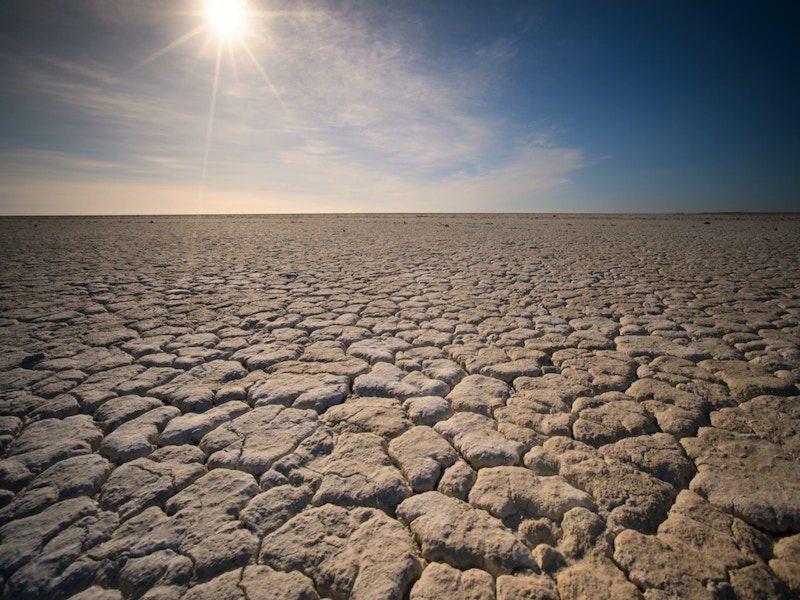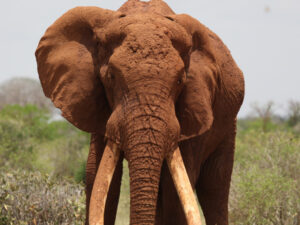We’re sleepwalking into a world of pain
When does a crisis not feel like one? A crisis doesn’t feel like a crisis when there is barely any mention of the crisis in the news. It doesn’t like a crisis when the electricity still works, or when hot water still streams from the shower. It doesn’t feel like a crisis when the transportation system is working or when supermarket shelves are full of food. While all of the evidence shows we’re hurtling towards a crisis of unimaginable proportions, at the moment the climate crisis just doesn’t feel like a crisis, and people are responding (by essentially doing nothing) based on that fact.
The issue is that when it does feel like a crisis, the impacts will be ferocious. So what exactly will the crisis look like when it does feel like a crisis? Here are six climate megatrends that are set to overwhelm humanity in the not-too-distant future.
1. Water scarcity
Record heatwaves are turning the world’s rivers, canals, and reservoirs to dust. As droughts become more severe, water scarcity will become all too common. In the early to mid-2010s, 1.9 billion people, lived in areas at risk from severe water scarcity. By 2050, this number will soar to between 2.7 to 3.2 billion people. The World Bank’s report, High and Dry, shows how water scarcity, exacerbated by climate change, could impact economic growth, increase migration, and spark conflict.
2. Climate refugees
Droughts are just one of a myriad of ecological threats on the horizon. As weather extremes become more aggressive these ecological threats are set to increase. The major risk is that “ecological threats are correlated with high levels of violence. This is due to systemic dynamics, whereby the depletion of resources and violent disputes reinforce one another, forming a vicious cycle.” In that climate, people will be forced to leave their homes. It’s estimated there will be one billion climate refugees by 2050, creating a humanitarian crisis that is set to create instability across the globe. Climate refugees will naturally migrate to habitable areas. It seems unlikely they’ll be welcomed with open arms. In fact, with a threat to their own living standards, it’s more likely this flood of people will be welcomed with violence as countries focus on securing critical resources for their own civilians.
3. Food shortages
Perhaps the most debilitating impact of a changing climate will be on food production. With 2°C of global warming, total production in the top four maize-exporting countries is projected to decline by 53 million tons, equivalent to 43 percent of global maize exports. 4°C of warming will see production decline by 139 million tons, which is 14 percent of global production and exceeds present-day exports.
Shortages are set to create massive instability in grain markets. Currently, the probability of a greater than 10 percent crop failure hitting each of the top four maize-exporting countries simultaneously is currently near zero, but “the probability of a synchronous crop failure of this order during the decade of the 2040s is just less than 50 per cent.” The 2006–2008 global food crisis illustrates the potential consequences of synchronous crop failures. Price spikes can lead to urban unrest and make governments vulnerable to collapse, particularly in developing countries. Due to this risk, many large exporting countries, including Brazil and Argentina, imposed export bans on maize during the food crisis, decreasing global supply. At the same time, maize-importing countries introduced trade incentives to lower the price of imported grain, increasing import demand. The combination of less supply and more demand led to maize prices spiking by 83 percent. It was a similar story for other staple grains like rice and wheat.
The FAO predicts food production must increase by at least 60 percent to meet the demands of a population that is predicted to hit nearly ten billion people by 2050. With yields declining at a time when demand for food is increasing it becomes apparent how seismic the consequences of mass crop failures will be.
4. Dramatic reductions in living standards
Globalisation can only work if every country is willing to sell on the open market, but as the impacts of the climate crisis become more aggressive, shortages could mean the benefits of selling products and produce at higher prices in the market are outweighed by the need to maintain law and order at home. Should countries become more protectionist, it would lead to a breakdown of the mechanisms needed for free trade. With chronic shortages, “a societal consensus could emerge that the free market economic model is unsustainable, and governments could move towards constraining people’s consumption…this could lead to macro-economic discontinuities with far-reaching consequences for inflation rates, asset prices, jobs and livelihoods.”
The idea that our consumption habits would need to be constrained will feel like a draconian measure, particularly when having more money and possessions than others is considered the epitome of social success. Governments will be aware such extreme measures will be deeply unpopular and are likely to trigger social unrest, but they’ll be faced with no other choice. Even if people want to continue ‘living their best lives’, as the venerable saying of our time goes, they won’t be able to.
5. Increased risk of war
The combined impacts of environmental changes are set to increase “the level of stress within national and international society, thus increasing the likelihood of many different kinds of conflict and impeding the development of cooperative solutions.” In a world of scarcity, the risk of war, including nuclear war, will increase as countries seek to gain control of critical resources.
6. Increased radicalisation
In Why Men Rebel, the political scientist Ted Robert Gurr argues people become discontent when they perceive a discrepancy between their expectations and society’s ability to maintain the standards of living they believe they are entitled to. When economic shocks, inflation and shortages are the order of the day, and crucially, when it becomes apparent a return to a period of stability is unfeasible, even to the most optimistic members of society, people will feel poor compared to a previous state of comfort. The World Economic Forum’s Global Risks Report 2022 argues that as more people begin to suffer the consequences of environmental changes, government failure to respond appropriately will lead to large sections of society becoming increasingly marginalised. As they do, there is a risk of radicalisation.
Make sacrifices now to save millions later
We know we’re hurtling towards a future of unimaginable chaos, suffering and instability, but how do we stop the crisis from feeling like a crisis? That all comes down to the actions taken now. The issue is that our approach to the crisis reflects the fact it still doesn’t feel like one. That’s why in the West there remains an unwavering belief that should we achieve net zero by 2050, everything will be okay. Underlying this belief is the hope that Western living standards can be maintained. The reality is that warming that will lead to catastrophic social unrest is already locked in. But time lags between emissions and real-world impacts create an illusion that there remains a window of opportunity to reverse the effects of a changing climate. That narrative dispels the idea that radical change is required to overcome the problem.
But radical transformation is precisely what’s needed to give us the best chance of preparing for a hostile future. That transformation must revolve around people being willing to make sacrifices to living standards. But it’s unfeasible that anyone would accept the need to do so. People are self-serving, it’s easy to forget about global problems when your lifestyle appears to be isolated from them. And so we’ll all continue to crack on until the world around us puts an end to the party. We’re going to learn in the most brutal fashion that you can’t have your cake and eat it.




What about biodiversity? We’re driving one million species to extinction. Animal species have seen 70% decline in the last 50 years.
https://www.nature.com/articles/d41586-019-01448-4
https://www.theguardian.com/environment/2022/oct/13/almost-70-of-animal-populations-wiped-out-since-1970-report-reveals-aoe